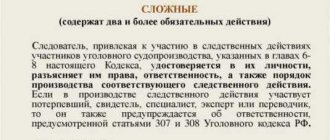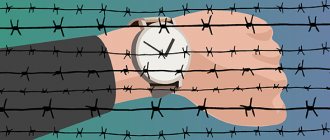ST 143 of the Criminal Code of the Russian Federation.
1. Violation of labor protection requirements, committed by a person entrusted with the obligation to comply with them, if this entailed through negligence the infliction of serious harm to human health, is punishable by a fine in the amount of up to four hundred thousand rubles or in the amount of the wages or other income of the convicted person for a period up to eighteen months, or compulsory labor for a term of one hundred eighty to two hundred and forty hours, or correctional labor for a term of up to two years, or forced labor for a term of up to one year, or imprisonment for the same term with deprivation of the right to hold certain positions or engage in certain activities activities for a period of up to one year or without it.
2. An act provided for in the first part of this article, resulting in the death of a person through negligence, is punishable by forced labor for a term of up to four years or imprisonment for the same term with deprivation of the right to hold certain positions or engage in certain activities for a term of up to three years or without it. .
3. An act provided for in the first part of this article, resulting through negligence in the death of two or more persons, is punishable by forced labor for a term of up to five years or imprisonment for the same period with deprivation of the right to hold certain positions or engage in certain activities for a term of up to three years. or without it.
Note : In this article, labor protection requirements are understood as state regulatory labor protection requirements contained in federal laws and other regulatory legal acts of the Russian Federation, laws and other regulatory legal acts of the constituent entities of the Russian Federation.
Legal advice on comments to Art. 143 of the Criminal Code of the Russian Federation
- Alina Bogdanova
If the boss violates!
Hello. Please tell me where to go if the boss violates security! There is a lot of equipment, but there is no grounding, the wiring often burns, the electricity cannot withstand and knocks out traffic jams. Where to go! So that they give him a fine and put his brains back in place! If something shorts out it can kill a person!!!! Lawyer's answer:
Dear Inna! The employer is obliged to provide safe working conditions in all workplaces. If he does not do this, then he violates Art. 212 of the Labor Code of the Russian Federation and your rights in accordance with Article 220 of the Labor Code of the Russian Federation. You have the right to contact the state labor inspectorate with a complaint, in which you state: “The employer did not ensure safety in the workplace in accordance with Article 212 of the Labor Code of the Russian Federation... “And you list what he didn’t do. If all this is confirmed, he faces administrative punishment (. And this could even be the suspension of the enterprise’s activities.
Incident at work. During the work, a citizen received a mild injury in the work area. What
- Lawyer's answer:
To bring criminal liability under Art. 143 of the Criminal Code of the Russian Federation (its text is below), the necessary consequence is either the infliction of serious harm to human health (Part 1 of Article 143 of the Criminal Code of the Russian Federation), or the death of a person (Part 2 of Article 143 of the Criminal Code of the Russian Federation). Here only slight harm was caused... Article 143. Violation of labor protection rules 1. Violation of safety rules or other labor protection rules, committed by a person who was responsible for complying with these rules, if this resulted through negligence in causing serious harm to human health, is punishable by a fine of up to two hundred thousand rubles or in the amount of wages or other income of the convicted person for a period of up to eighteen months, or by compulsory labor for a term of one hundred eighty to two hundred and forty hours, or by corrective labor for a term of up to two years, or by imprisonment for a term of up to one year. (as amended by Federal Laws dated December 8, 2003 N 162-FZ, dated May 6, 2010 N 81-FZ) 2. The same act, which through negligence resulted in the death of a person, is punishable by imprisonment for a term of up to three years with deprivation of the right to occupy certain positions or engage in certain activities for a period of up to three years or without it. (as amended by Federal Law dated December 8, 2003 N 162-FZ)
Can a woman register a child with her ex-husband if the child is not his? My husband found himself in this situation. Divorced from his ex-wife. Left for another city. I lived in this city for quite a long time and did not leave. After 3 years, his ex calls and says that she gave birth (from someone else) and listed my husband as the father of the child. Is this legal? And how to confirm the fact that the child is not his and remove the record of paternity? Help me please!! ! Very urgent!! ! Thank you in advance..
- Of course not, they are divorced! and you are married, it’s easy to file an application to deny paternity, due to the fact that he is not paternity. and where and how, it’s up to you to specify
Task 2 on criminal law. While replacing a burnt-out light bulb, electrician Sukhov, violating safety regulations for explosive enterprises, did not cover the explosives in the room with a special film. An explosion occurred from an electric spark, as a result of which the walls of the room were destroyed and a worker who was passing by at that time was killed. Determine the form of Sukhov's guilt.
- Lawyer's answer:
I am answering you as an expert - what kind of substance is this that exploded from an electric spark?? and what will be the form of Sukhanov’s guilt if the explosion occurred in the room where he was replacing a light bulb?? No one will present anything to him anymore, because he’s a corpse??? How did an electric spark get from the ceiling or wall to the explosive?? By the way, in such premises explosion-proof lamps are used from which there are no sparks in principle, there is a substance that can detonate from electric heating - tetryl - but nowhere and never is it stored just like that - your task is extremely stupid - Sukhonov is guilty - but no one can present it he won’t be able to, because Sukhanov is a corpse (if the wall was destroyed by an explosion, Sukhanov certainly won’t survive at the epicenter of the explosion)
There has been no change of power in Russia for 20 years, and as a result, the concept of democracy has been completely discredited?
- I agree, only taking into account the principles of boards and rulers, I ask you to add another 500 years to the twenty, because sole power, based on favorites and rich people (no matter what they are called) has always been in Russia (no matter what it is called). . On the…
SPECIAL SUBJECT OF CRIME
A special subject of a crime is a person who, by virtue of their official position or by special order, is directly entrusted with the obligation to ensure compliance with labor protection requirements in a certain area of work, as well as heads of enterprises and organizations, their deputies, chief engineers, chief specialists of enterprises, if they did not take measures to eliminate violations of labor safety requirements known to them, or gave instructions that contradict these rules, or, having taken on direct management of certain types of work, did not ensure compliance with the same rules. In other cases, officials guilty of improper performance of their official duties to ensure safe working conditions may be held liable for malfeasance (for example, for failure to take measures to develop appropriate instructions, to create conditions for compliance with labor safety rules and regulations, to implement proper monitoring their compliance). At the same time, the subjects of these crimes can be citizens of the Russian Federation, foreign citizens, as well as stateless persons. If a violation of labor safety rules and regulations was committed by an employee who was not a person specified in Art. 143 of the Criminal Code of the Russian Federation, and entailed the consequences listed in this article, the act should be considered as a crime against the person, regardless of whether the victim is related to this proceeding or not. Source: Commentary on the Criminal Code of the Russian Federation: in 2 volumes (article-by-article) / A.V. Brilliantov, G.D. Dolzhenkova, E.N. Zhevlakov and others; edited by A.V. Brilliantova. 2nd ed. M.: Prospekt, 2015. T. 1. 792 p.
Commentary on Article 143 of the Criminal Code of the Russian Federation
The set of social relations that are the object of a criminal attack is the current rules and regulations of labor protection. An optional subject is the life and health of company personnel.
The crime has a material composition and is considered completed from the moment of causing damage to the victim, defined as serious damage to health. A conclusion about the nature of the damage caused can only be made after a forensic examination. If it turns out that the physical injuries received do not threaten the life of the victim, no crime will be formed.
The objective side is expressed in an unintentional violation of safety regulations, which, in accordance with the Criminal Code of the Russian Federation, resulted in injury, mutilation or death of a person. The organizational and legal form of the enterprise where the accident occurred does not matter. Responsibility comes in any case.
Only persons who have an actual employment relationship with the employer are recognized as victims.
These include employees:
- officially employed by the company;
- working under civil contracts;
- with whom a fixed-term or seasonal contract has been concluded.
Article 143 of the Criminal Code does not recognize other citizens who suffered as a result of non-compliance with security requirements as victims. Harm to people outside the organization will be defined as a crime against the person or abuse of power.
To qualify an act under 143 of the Criminal Code of the Russian Federation, a combination of the following factors is required:
- The action or inaction of the accused must entail the actual occurrence of the consequences specified in the disposition.
- The resulting consequences are a direct consequence of violating the safety rules.
- The indirect intent of the suspect, expressed in the form of frivolity or criminal negligence, was discovered.
If the victim was injured due to his own negligence, then an acquittal must be rendered against the person responsible for maintaining safety standards in the organization. .
OBJECTIVE SIDE OF THE CRIME
The objective side of the crime includes: an act in the form of action or inaction, consisting of a violation of labor protection requirements; socially dangerous consequences in the form of serious harm to health (in the main part of the crime), the death of an employee (in a qualified personnel with aggravating circumstances) or the death of two or more persons in a particularly qualified personnel; a causal relationship between an action (inaction) and socially dangerous consequences. Labor protection requirements are understood as state regulatory labor protection requirements contained in federal laws and other regulatory legal acts of the Russian Federation, laws and other regulatory legal acts of the constituent entities of the Russian Federation. Labor protection should be understood as a system for preserving the life and health of workers in the process of work, including legal, socio-economic, organizational and technical, sanitary and hygienic, treatment and preventive, rehabilitation and other measures (Part 1 of Article 209 of the Labor Code of the Russian Federation ). The objective side of violation of labor protection requirements is formed by the action or inaction of subjects who deviate from general industry or local standards that ensure the safety of workers. This may be, for example, not providing instructions on compliance with safety regulations; permission to work on faulty equipment, violation of the technological process, failure to provide special protective equipment, etc. Considering that the disposition of Art. 143 of the Criminal Code of the Russian Federation is blanket, therefore, in order to establish signs of a crime, it is necessary to be guided by the provisions of regulations that specify safety rules and other labor protection requirements when performing specific work. In cases of this category, it is necessary to limit the crimes provided for in Art. 143 of the Criminal Code of the Russian Federation, from crimes provided for in Art. 216 of the Criminal Code of the Russian Federation, taking into account that when resolving this issue, one should proceed from the specific work in which safety requirements were violated. If a violation of these requirements (including labor safety rules) was committed during mining or construction work, then the offense must be qualified under Art. 216 of the Criminal Code of the Russian Federation. It should be borne in mind that the legal liability for violations of labor protection requirements for persons obliged to ensure compliance with these rules occurs regardless of the form of ownership of the enterprises at which they work. The corpus delicti is material. The act is completed from the moment the socially dangerous consequences occur. In a number of cases, the objective side of the crime is formed by a series or system of actions of several different subjects. For example, when working in a mine, each of the teams consistently did not take measures to reduce methane levels after the shift. The critical point of gas concentration and the explosion followed the actions of the members of the last brigade, which died in the explosion. In this and similar cases, the question arises about the presence of a crime in the actions (inaction) of persons who had not previously taken the necessary measures, which created the conditions for the commission of a criminal act at the final stage. From our point of view, in such situations, the persons who created the conditions are not subject to criminal liability, since there is no direct and immediate causal connection between their act and the socially dangerous consequences that have occurred.
Another commentary on Article 143 of the Criminal Code of the Russian Federation
Only an individual who is obliged to control and ensure security at the enterprise can be the subject of a crime.
These responsibilities may arise:
- under the terms of the employment contract (collective or individual);
- from the specifics of the position held.
In addition, they may be due to direct requirements of legislative acts.
The presence or absence of citizenship of the person who committed the crime does not matter. The subject may be a citizen of the Russian Federation, a foreigner or a person deprived of citizenship.
According to the resolution of the Plenum of the Supreme Court, the following may act as a subject:
- Director.
- Technical supervisor.
- The responsible employee who did not take measures to eliminate existing violations.
- Other persons responsible for monitoring compliance with labor discipline standards.
The subjective side is expressed in the careless attitude (negligence or dishonesty) of an official towards his duties to comply with the requirements of legislation in the field of occupational safety. If during the proceedings a direct intention to injure an employee is revealed, the act will be reclassified. The offender will be liable for intentionally causing minor or moderate harm to health (111, 112 of the Criminal Code). In addition, he may be charged with intent to kill the victim (105 of the Criminal Code of the Russian Federation).
It will not be possible to initiate a criminal case under Article 143 of the Criminal Code against a person who has violated safety rules but does not have the appropriate status. Ordinary citizens are responsible for manslaughter (109) or infliction of grievous bodily harm (118) of the Criminal Code of the Russian Federation.
Who is responsible
Article 22 of the Labor Code of the Russian Federation obliges the employer to bear responsibility for working conditions. A director or individual entrepreneur personally performs these functions or delegates powers to specially appointed persons. In any case, the manager controls and is aware of the activities of authorized employees. Art. 217 of the Labor Code of the Russian Federation explains who and in what case is the organizer of labor protection measures and is subject to liability before the law for their non-compliance.
In the absence of an appropriate department (the number of the workforce is less than fifty people), duties can be performed by:
- Individual entrepreneur.
- Director.
- Accredited expert, organization - outsourcers in the field of labor protection.
- The manager has the right to consider the issue of creating a department with the appointment of its head or introducing the position of a safety engineer.
If the workforce of a private or state company is fifty people or more, then, according to the labor code, a labor protection service must be created.
The rules apply to everyone, regardless of their form of ownership. For a private enterprise, no differences from the established procedure are allowed.
SUBJECTIVE SIDE OF CRIME
The subjective side of the crime is characterized only by a careless form of guilt in the form of frivolity or negligence. The culprit, violating labor safety requirements, foresees that thereby he could cause harm to health or death, but without sufficient grounds for this he expects to prevent these consequences (frivolity) or does not foresee the possibility of the occurrence of these consequences, but should have and could have foreseen (negligence) . In the case where the intent of the perpetrator was aimed at achieving a criminal result, and the method of implementing such intent was a violation of labor protection and work safety rules, the act must be qualified under the relevant article of the Criminal Code of the Russian Federation, which provides for liability for committing an intentional crime. If the perpetrator, by violating these requirements, pursued the goal of causing certain consequences, and his attitude towards the occurrence of other consequences was in the form of careless guilt, the act should be classified according to the totality of crimes committed intentionally and through negligence (Resolution of the Plenum of the Supreme Court of the RSFSR dated April 23, 1991 No. No. 1 “On judicial practice in cases of violations of labor protection and safety rules during mining, construction or other work” (as amended on December 21, 1993) // Collection of decisions of the Plenum of the Supreme Court of the Russian Federation. M.: Legal literature , 1994).
Punishment options
Inspections by regulatory and supervisory authorities, for example, routine prosecutorial inspections, may reveal an industrial safety violation.
If the shortcomings were committed due to negligence or frivolity, and the consequences listed by the Criminal Code did not occur, then unscrupulous authorized persons are subject to other types of influence:
- Material.
- Disciplinary.
- Administrative.
In this case, the legislation provides for sanctions that are more lenient than when initiating a criminal case. Other employees are responsible for irresponsible behavior in the same manner.
If serious consequences occur, employees become accused of a crime - causing death by negligence, causing grievous harm to health by negligence. .
Important: the listed types of liability apply only when the act was committed unintentionally. If intent is detected, a different, more serious classification of the offense is applied.
Disciplinary action
The types and rules of application are established by the Labor Code of the Russian Federation.
These include:
- dismissal;
- comment;
- rebuke.
Their use is possible only if clearly defined conditions are met:
- Obtaining an explanation from the offending employee.
- Compliance with the statute of limitations.
- One punishment for one offense.
If an employee does not agree with the manager’s decision, he has the right to file a complaint with the State Labor Inspectorate, the prosecutor’s office, or the court.
Material compensation
The concept and rules of application are fixed by the labor code.
Depending on the circumstances, financial liability applies:
- within the limits of salary. Collected when the employer needs to pay expenses to correct the consequences or compensate for damage caused to third parties;
- complete. Implemented if an employee has committed an administrative violation recorded by a government agency - a protocol on administrative violation has been drawn up.
The manager, taking into account the circumstances, may refuse to partially or fully recover damages from the offending employee.
Administrative violation
An unlawful act is committed through inaction or action. May entail:
- fine:
- suspension of activities for ninety days;
- disqualification for up to three years.
State regulatory bodies have the right to bring administrative liability.
Another commentary on Article 144 of the Criminal Code of the Russian Federation
1. Article 29 of the Constitution of the Russian Federation proclaims the right of everyone to seek, receive, transmit, produce and disseminate information in any legal way. This most important political right of citizens is of paramount importance to the press and other media. Infringement of their freedom entails liability in accordance with the legislation of the Russian Federation.
The commented article deals with the danger and punishability of actions that interfere with the legitimate professional activities of journalists.
2. The immediate object of this crime is freedom of the press and other media. A journalist is understood as a person who collects, creates, edits or prepares materials for the media, is associated with him through labor or other contractual relations, or is engaged in such activities under his authority.
The media refers to newspapers, magazines, television and radio programs, documentary films, and other forms of public dissemination of mass information.
3. The objective side of the crime is expressed in action (inaction), characterized by: a) obstruction of the legitimate professional activities of journalists; b) forcing them to disseminate certain information; c) in coercion to refuse to disseminate certain information.
Obstruction of the legitimate professional activities of journalists means opposition from various persons: the establishment of censorship; interference in the activities and violation of the professional independence of the editorial board; illegal termination or suspension of the activities of a mass media outlet; violation of the editor's right to request and receive information; illegal seizure, as well as destruction of the circulation or part thereof; restrictions on contacts with a journalist and the transfer of information to him, with the exception of information constituting a state, commercial or other secret specially protected by law. Forcing journalists to disseminate or, conversely, not to disseminate information can be expressed in blackmail, promises of promotion or, conversely, threats to slow down such promotion, etc.
4. The elements of this crime are formal: it is considered completed from the moment one of the specified actions is committed, regardless of the consequences, i.e. regardless of whether the perpetrator actually managed to force the journalist to disseminate (or not disseminate) information in the interests of the perpetrator, and also regardless of the occurrence of other consequences.
5. The subjective side of the crime is characterized by direct intent. The person realizes that by his actions he is trying to interfere with the legitimate professional activities of the journalist, and wants to commit these actions. The motives can be either personal or other in nature (falsely understood official interests, political sympathies or antipathies, sympathy for persons interested in the dissemination or, conversely, in the non-dissemination of this information, etc.). They do not affect the qualification of the act.
6. The subject of the crime provided for in Part 1 of the commented article is a person who has reached the age of 16. If a person acted on behalf of a body, institution or organization, he bears only personal responsibility for his actions, regardless of the administrative or other responsibility of this organization.
7. Part 2 art. 144 establishes increased criminal liability if the crime is committed using the perpetrator’s official position. The use of official position should be understood as the use of opportunities arising from the official status of the perpetrator, as well as official connections and actions that go beyond the scope of direct official authority, i.e. their excess (for example, the head of an institution or enterprise issues an order not to allow journalists into the territory of the relevant institution or enterprise).
Criminal Code of the Russian Federation. Article 143. Violation of labor protection requirements
1. Violation of labor protection requirements, committed by a person entrusted with the obligation to comply with them, if this entailed through negligence the infliction of serious harm to human health, is punishable by a fine in the amount of up to four hundred thousand rubles or in the amount of the wages or other income of the convicted person for a period up to eighteen months, or compulsory labor for a term of one hundred eighty to two hundred and forty hours, or correctional labor for a term of up to two years, or forced labor for a term of up to one year, or imprisonment for the same term with deprivation of the right to hold certain positions or engage in certain activities activities for a period of up to one year or without it.
2. An act provided for in the first part of this article, resulting in the death of a person through negligence, is punishable by forced labor for a term of up to four years or imprisonment for the same term with deprivation of the right to hold certain positions or engage in certain activities for a term of up to three years or without it. .
3. An act provided for in the first part of this article, resulting through negligence in the death of two or more persons, is punishable by forced labor for a term of up to five years or imprisonment for the same period with deprivation of the right to hold certain positions or engage in certain activities for a term of up to three years. or without it.
Note. In this article, labor protection requirements are understood as state regulatory labor protection requirements contained in federal laws and other regulatory legal acts of the Russian Federation, laws and other regulatory legal acts of the constituent entities of the Russian Federation.
Commentary to Art. 143 of the Criminal Code of the Russian Federation
1. The social danger of the crime lies in the violation of the constitutional right to work in conditions that meet the requirements of safety and hygiene (Part 3 of Article 37 of the Constitution). The crime in question interferes with the implementation of state policy in the field of labor protection, one of the directions of which is to ensure the priority of preserving the life and health of workers (Article 210 of the Labor Code).
2. The objective side of the crime is expressed in the form of an action or inaction, consisting of a violation of safety rules or other labor protection rules and resulting in socially dangerous consequences in the form of serious harm to health (in the main element of the crime) or the death of an employee (in a qualified personnel with aggravating circumstances) .
3. Considering that the disposition of the commented article is blanket, in order to establish the elements of a crime it is necessary to be guided by the provisions of regulations that specify safety rules and other labor protection rules when performing specific work. In cases of this category, it is necessary to limit the crimes provided for in Art. 143 of the Criminal Code, from crimes provided for in Art. 216 of the Criminal Code, taking into account that when resolving this issue, one should proceed from the specific work in which safety rules were violated. If a violation of these rules (including labor safety rules) was committed during mining or construction work, then the offense must be qualified under Art. 216 of the Criminal Code. It should be borne in mind that the legal liability for violations of safety rules or other labor protection rules for persons obliged to ensure compliance with these rules occurs regardless of the form of ownership of the enterprises where they work.
4. The corpus delicti is material. The act is completed from the moment the socially dangerous consequences occur. If the violation of labor protection rules did not entail the consequences specified in the commented article, liability for the violation should arise under Art. 5.27 Code of Administrative Offences.
5. The subjective side of the crime is characterized only by a careless form of guilt in the form of frivolity or negligence.
6. The subject of the crime - special - are persons who, by virtue of their official position or by special order, are directly entrusted with the obligation to ensure compliance with the rules and regulations of labor protection in a certain area of work, as well as heads of enterprises and organizations, their deputies, chief engineers, chief specialists of enterprises, if they did not take measures to eliminate violations of labor safety rules known to them, or gave instructions that contradict these rules, or, having taken on direct management of certain types of work, did not ensure compliance with the same rules. In other cases, persons guilty of improper performance of their official duties to ensure safe working conditions may be held liable for malfeasance (for example, for failure to take measures to develop appropriate instructions, to create conditions for compliance with labor safety rules and regulations, to exercise proper control for their compliance). However, if a violation of the rules and regulations of labor protection was committed by an employee who was not the person specified in the commented article, and entailed the consequences listed in this article, the act should be considered as a crime against the person, regardless of whether the victim is related to this production or not. In contrast to the commented article, liability under Art. Art. 216 and 217 of the Criminal Code may be borne by both persons who are entrusted with the obligation to comply with the rules and regulations of labor protection, and other employees whose permanent or temporary activities are related to this production.
Judicial practice under Article 143 of the Criminal Code of the Russian Federation
A selection of judicial practice with expert comments, containing convictions and acquittals, is presented on the Consultant Plus website.
Citizen V. A. Ivanov worked in construction as a chief engineer from 2010 to 2021. According to the concluded employment contract, he was responsible for compliance with labor safety requirements during construction work. In 2021, an employee of the organization died during the construction of a trade pavilion.
During the pre-trial investigation, the following facts were established:
- Ivanov’s negligent attitude towards his duties to monitor compliance with TB;
- violation of safety regulations, namely the absence of safety ropes when performing high-altitude work, resulted in the biological death of the victim.
Ivanov’s actions were qualified by the court as a crime, which is provided for in Article 143, Part 2 of the Criminal Code of the Russian Federation. The court issued a guilty verdict. The punishment was two years' imprisonment, to be served in a penal colony.







